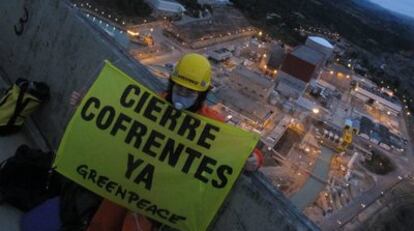Nuclear sites given new lease of life by cross-party deal
A Senate amendment eliminates restrictions on the operational lifespan of plants to complete Socialist U-turn on atomic energy
An agreement reached on Tuesday between the Socialist government and the three next largest political forces in Congress has opened the possibility of prolonging the operational lives of Spain's aging nuclear plants beyond the 40-year timeframe the prime minister had originally fixed.
According to government sources, the text of the accord signed with the Popular Party, the CiU Catalan nationalist bloc and the Basque Nationalist Party (PNV), will remove from the Sustainable Economy Law all mention of the 40-year lifespan of plants and signifies a further step in the government's slow but sure volte-face on nuclear power.
The operational existence of nuclear power in plants in Spain is not set in stone in any legislation. The Garoña plant in Burgos is the current testing ground for a future law. When announcing the projected closure of the plant in 2013, Prime Minister José Luis Rodríguez Zapatero called for an operational limit of 40 years for nuclear sites to be made law. In 2013, Garoña will have been functioning for 42 years. The text of the Sustainable Economy Law allows for "cases of extraordinary renewal of [nuclear] concessions above 40 years."
The Industry Ministry had always intended to seek an extension for the Garoña plant and Zapatero has maintained that the government will be flexible on the matter of nuclear power stations. During recent negotiations with trade unions to seal a social and economic pact, the prime minister said he was amenable to revising Garoña's status.
The PNV stated that the accord would not affect Garoña, which sits near the border with the Basque Country, but the CiU- the driving force behind yesterday's accord- maintains that it will. The Socialist congressional spokesman, José Antonio Alonso, justified the government's change of posture: "The amendment says what it says. Neither one thing nor the other."
Earlier on Tuesday, 16 Greenpeace activists gained access to the Cofrentes nuclear power station in Valencia to urge the Nuclear Security Council and the government not to renew the site's operational status. The protestors were arrested by the Civil Guard.
Responding to allegations that two security guards were injured during the break in, the organization stated on its website that "at no way had [the injuries] been caused by violent behavior on the part of activists." Greenpeace continued by saying that such accusations were "a distraction" from what it called the "key question: the lack of security at nuclear sites and the urgent need to establish a timeframe for closures."

Tu suscripción se está usando en otro dispositivo
¿Quieres añadir otro usuario a tu suscripción?
Si continúas leyendo en este dispositivo, no se podrá leer en el otro.
FlechaTu suscripción se está usando en otro dispositivo y solo puedes acceder a EL PAÍS desde un dispositivo a la vez.
Si quieres compartir tu cuenta, cambia tu suscripción a la modalidad Premium, así podrás añadir otro usuario. Cada uno accederá con su propia cuenta de email, lo que os permitirá personalizar vuestra experiencia en EL PAÍS.
¿Tienes una suscripción de empresa? Accede aquí para contratar más cuentas.
En el caso de no saber quién está usando tu cuenta, te recomendamos cambiar tu contraseña aquí.
Si decides continuar compartiendo tu cuenta, este mensaje se mostrará en tu dispositivo y en el de la otra persona que está usando tu cuenta de forma indefinida, afectando a tu experiencia de lectura. Puedes consultar aquí los términos y condiciones de la suscripción digital.








































